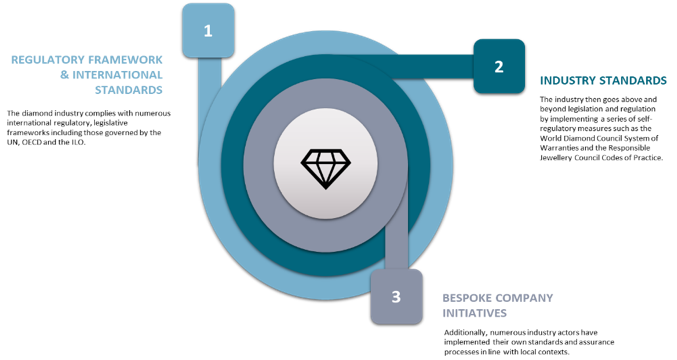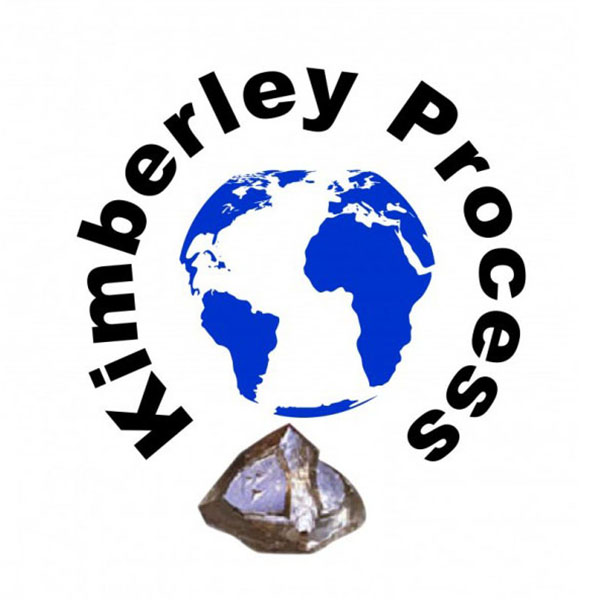The Framework for an Ethical and Sustainable Diamond Industry
The natural diamond industry operates as a large and diversified ecosystem of organizations and communities.
From large-scale diamond mining companies, like the members of the Natural Diamond Council, to independent diamond retailers and designer brands, everyone plays a role in ensuring the entire diamond value chain is upholding the highest standards, from the people whose lives we touch to the environment in which we operate.
Did You Know? 85% of the world’s natural diamonds by volume and 95% by value are extracted and marketed by large scale mining companies, located in geographically diverse locations, including Canada, and Botswana. These ethical diamond companies operate with a high level of transparency and take responsibility for their societal and environmental impact, published in audited sustainability reports.
Every purchase of a natural diamond supports an ethical diamond industry that values responsible and transparent business practices, while helping local communities to generate long-term sustainable development and a lasting positive legacy.
Natural Diamond Council Members directly and indirectly support the livelihoods of more than 10 million people worldwide, generating more than US $16 billion per year in net socio-economic and environmental benefits. [Source: Trucost ESG Analysis].
These benefits are infused into communities through local employment, education, sourcing of goods and services, taxes and royalties, social programs, and infrastructure investment.
Read more about the impact of the natural and sustainable diamond industry here and also discover key sustainability programs supported by Natural Diamond Council members.
Below, you will discover how ethical diamonds travel through the supply chain in an ethical and sustainable way. For an overview of how diamond industry regulations, standards and self-regulation programs fit together, look at the diagram below:

1. Regulatory Framework and International Standards
The natural diamond industry abides by numerous international human rights frameworks and labor regulations, alongside country-specific regulations and further rigorous ethical, social, and environmental requirements to ensure it does business in the ethical diamond industry in a responsible way.
Some important examples of these are explained below:
- The UN Convention Against Corruption is used as a guideline by international bodies to act against corruption and money laundering. It aligns with the Financial Action Task Force (FATF 40) Recommendations on Money Laundering for Dealers in Precious Metals and Stones.
- The Organization for Economic Co-operation and Development (OECD) Due Diligence Guidance for Responsible Supply Chains of Minerals from Conflict Affected and High-Risk Areas is the foundation for a number of standards, certifications and regulations developed in recent years to increase transparency in jewelry supply chains. By following this guidance, jewelry companies respect human rights, avoid contributing to conflict, and can create their own framework for due diligence.
- The UN Guiding Principles on Business and Human Rights and The International Labour Organisation (ILO) Declaration on Fundamental Principles and Rights at Work apply to all nations and to all business enterprises, regardless of their size, sector, location, ownership and structure.
- All Natural Diamond Council members must comply with relevant international and national environmental legislation and are aligned with international standards such as ISO 14001, which provides a framework for an effective environmental management system (EMS). The NDC members must publicly report annually on their adherence to the Sustainability Commitments utilising the Global Reporting Initiative (“GRI”) Guidelines and GRI Mining and Metals Sector Supplement or comparable guidelines.
The United Nations Global Compact (UNGC) and the 17 UN Sustainable Development Goals (SDGs) provide a guiding framework for all organizations in defining and tracking their sustainability programs. All Natural Diamond Council members have developed sustainable diamond strategies that are aligned with and support the UN Sustainable Development Goals in their operations.
The Kimberley Process
The Kimberley Process, also known as the Kimberley Process Certification Scheme (KPCS), is a joint initiative between governments, diamond industry bodies and civil society, mandated by the United Nations and the World Trade Organization, to stem the flow of ‘Conflict Diamonds.’
This ‘tripartite composition’ of the Kimberley Process ensures its relevance and increases its impact. The Process, open to all countries, became operational in 2003 to control trade in rough diamonds between participating countries. The KPCS seeks to stop the illicit diamond trade and ensure that purchases of natural diamonds do not finance violence by armed movements and their allies seeking to undermine legitimate governments. It is a legal requirement that all rough diamond exports are accompanied by a government-validated Kimberley Process Certificate.
“The Kimberley Process has been notably successful in promoting peace in diamond-producing countries.”
In accordance with the KPCS, participants (countries) must satisfy minimum requirements and establish national legislation, institutions and import/export controls; commit to transparent practices and to the exchange of critical statistical data; trade only with fellow members who also satisfy the fundamentals of the agreement; and certify shipments as conflict-free and provide the supporting certification.
2. Ethical Diamond Industry Standards
The diamond industry goes above and beyond the Kimberley Process by committing to a range of self-regulatory measures that encompass people, planet, and business ethics. This includes codes of conduct and guidelines for the diamond industry, as well as third-party oversight measures and own in-house due diligence structures. This is an ongoing, proactive and reactive process through which diamond companies can ensure they protect human rights and generate value from sustainable diamonds.
World Diamond Council System of Warranties
As the body that represents the diamond industry in the ‘tripartite composition’ of the Kimberley Process, the World Diamond Council created the System of Warranties (SoW) to strengthen the KPCS through diamond industry self-regulation that covers not only trade in rough diamonds, but also trade in polished diamonds and diamond jewelry.
The System of Warranties extends the effectiveness of the KPCS by covering international and domestic trade, as well as all the segments of the diamond pipeline from diamond mines to retail. It also sets out self-assessment standards on anti-money laundering, anti-corruption, and protection of human and labor rights.
How does it work? All buyers and sellers of diamonds who are WDC members or System of Warranties adherents must include the following SoW statement on all invoices:
“The diamonds herein invoiced have been {sourced}* purchased from legitimate sources not involved in funding conflict, in compliance with United Nations Resolutions and corresponding national laws {where the invoice is generated}**. The seller hereby guarantees that these diamonds are conflict free and confirms adherence to the WDC SoW Guidelines.”
*{sourced} – may be used by companies that do not purchase from open market, but source and aggregated diamonds from production facilities that are owned/partly owned by them. **{where the invoice is generated} – may be used by companies if they specifically want to reference the country of invoice issuance.
Sustainable companies trading in natural diamonds must keep records of the warranty invoices they receive and the warranty invoices they issue. This flow of warranties in and out must be audited and reconciled on an annual basis by the diamond company’s own auditors.
The SoW applies to invoicing of all diamonds, whether rough or polished, loose or set in jewelry, regardless of size or quality. Diamond industry organizations and their members self-regulate by trading only with companies that include warranty declarations on their invoices and by refusing to buy diamonds from suspect sources or that originate in countries that have not implemented the KPCS.
Responsible Jewelry Council Codes of Practice
The Responsible Jewelry Council (RJC) is the leading global standards and certification organization for the jewelry and watch industry and brings together a global set of standards providing clear and independent assurance.
Members of the RJC must be certified against the RJC’s Code of Practices spanning the full jewelry supply chain from gem and diamond mine to retail. This requires an independent third-party audit of a member’s business, focusing on business ethics, responsible supply chains, human rights and due diligence, labor rights and working conditions, health, safety, and environmental management.
By adhering to the RJC Code of practices, certified companies respect a range of principles and standards, including: ILO Labor Standards, OECD Due Diligence Guidance for Minerals & Metals, UN Guiding Principles on Business & Human Rights, UN Global Compact, and Sustainable Development Goals (SDGs) and the 2030 Agenda. The RJC conducts its standard setting in conformance with the ISEAL Code of Good Practice for Setting Social and Environmental Standards.
3. Diamond Company Initiatives
The diamond industry therefore works tirelessly to ensure that consumers can buy diamonds with confidence. Numerous companies have established their own standards and assurance processes to go alongside international and industry-wide legislation and standards.
Supply Chain Initiatives
Many organizations also set up their own diamond standards based on and in addition to international ones to cascade responsible business conduct from sustainable diamonds along the diamond supply chain. For example, natural diamond producers have developed business practices requirements for all those doing business with them. Such programs include the De Beers Group Best Practice Principles (BPPs) Assurance Programme, and Regulations on Responsible Diamond Supply Chain Management.
Such requirements for responsible practices are also implemented by the world’s largest diamond jewelry retailers, including Signet Jewelers who introduced its own Responsible Sourcing Protocol for Diamonds, Chow Tai Fook Jewelry developed the Code of Practice for Supplier Assessment, Tiffany & Co. developed a Supplier Code of Conduct.
Environmental & Ethical Diamond Initiatives
Large scale diamond mining companies also adhere to strict environmental standards and develop environmental management, monitoring, and protection plans. These plans are created in collaboration with local communities, as well as local and national governments, through a comprehensive multi-stakeholder engagement process that begins before permitting, well over a decade before one single sustainable diamond is recovered.
Natural Diamond Council members lay a large focus on defining, tracking and reporting on their sustainability programs, aligning with sustainable diamond standards such as ISO 14001-the international standard that specifies requirements for an effective environmental management system (EMS), the Carbon Disclosure Project for the management of environmental impact, and the GRI global standard for sustainability reporting, and the UNGC.
Did you Know? Natural Diamond Council members protect 1,023 square miles of land, which is three times more than land they use.
De Beers Group has played a leading role in conservation by creating one of Africa’s most extensive and important conservation networks, the Diamond Route. This comprises eight different diamond mining sites across South Africa and Botswana-equating to around 200,000 hectares (or 2.5 times the area of New York City)-containing unique habitats that are home to vulnerable, threatened and endangered species.
The Diavik diamond mine in Canada installed a 9.2 MW wind farm in 2012. The wind farm–the most northern wind farm in the world–provides up to 10% of the mine’s energy needs and replaces about 900,000 gallons of diesel fuel per year. For this achievement, Diavik was awarded a Group Leadership Award from the Canadian Wind Energy Association.
Lucara was elected by the Prospectors and Developers Association of Canada (PDAC) to receive its 2016 Environmental and Social Responsibility Award. This award honors an individual or organization demonstrating outstanding initiative, leadership and accomplishment in protecting and preserving the natural environment.
Learn more about the environmental and social initiatives, as well as how the natural diamond industry contributes to the realization of the UN Sustainable Development Goals based on ethical diamond practices.
What Can You Do?
As an independent diamond retailer, jewelry designer-maker, member of the press or consumer, you can play a role in driving positive change in any industry by asking questions. The diamond industry is no exception.
Ask Us a Question: info@naturaldiamonds.com


